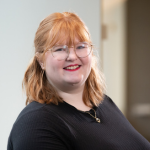Emily Little
Emily Little (MSJ21)
Associate Editor, Food Technology magazine
 Tell us about your career path. How did you get where you are today?
Tell us about your career path. How did you get where you are today?
I thought I wanted to be a scientist for most of my life. I studied chemistry during my undergrad at Adrian College, but soon realized I didn’t want to be stuck in a lab. After taking a couple journalism classes, I had a heart-to-heart talk with my professor about how to combine my two loves: science and writing. She turned my attention to the world of science journalism and eventually helped me find Medill.
After finishing my masters at Medill, I spent about a year freelancing for various publications, including the Chicago Tribune. I joined the Institute of Food Technologists in 2022 as the associate editor of their flagship magazine, Food Technology.
What are your main responsibilities in your current role?
I am in charge of researching and writing three sections of the magazine: Omnivore, which consists of a mix of small news stories, consumer trends, community updates, and innovative research around the food industry; Food Snapshot, a one-page infographic on a specific topic related to food; and New Products, a one-page column of three new CPG products available for purchase. I also populate the daily newsletter, Food News Now, and write additional features as needed.
How has your Medill training helped you in your career?
Medill gave me a journalistic playground, if you will, to try different stories and different mediums. I had the chance to experiment with the Knight Lab tools for storytelling, which we’re looking into using for our magazine’s digital content. I also learned about so many different mediums of news stories, from video to Q&A to audio. Each has its own unique purpose, and Medill gave me the space to explore all of these options.
How has the Northwestern Medill network helped you advance in your career?
My editor-in-chief is actually a Medill alum! During my interview, he noticed my Northwestern pennant near my bookcase. I told him about my experience at Medill, and we immediately connected.
How can your industry be more inclusive and representative of society?
I think we, as journalists, have a really unique opportunity to showcase a larger, more inclusive segment of the population. In the end, we’re storytellers. And those stories can be so impactful. I recently helped a woman from Sudan write an op-ed for our magazine about her experiences as the first certified food scientist from her country and how her life was impacted by the war. She went through so many hardships, and still wanted to sit down with me over Zoom to learn about the writing process and how to tell her story in the best way possible. That was a humbling moment for me and a reminder that I’m in a position to tell more stories like this.
How have your identities influenced the way you navigate your professional career?
Being a queer woman in any industry is like walking on eggshells. You don’t want to offend anyone by saying no to their requests, but you have to think about your own safety and boundaries. For example, my second editor at the Tribune sent me an address and asked me to go and ask the man questions about his recently deceased son without any announcement. I, of course, said no, and had to explain to my editor that the situation made me feel uneasy and unsafe. I had to learn early on that my boundaries matter, and I do my best work when those boundaries are maintained and respected. I’ve learned that it’s okay to speak up when I’m uncomfortable with something and it’s okay to give my opinions. I’m really grateful that my team at IFT gives me that latitude to share my thoughts.
What advice do you have for someone considering Medill?
Be curious! You’re in a space with experts, tools, and peers that want to help you. If you’ve always wanted to learn about what makes a good radio story, take Natalie Moore’s audio reporting class. If you find yourself reading op-eds and wanting to learn more, take Mei-Ling Hopgood’s personal narrative class. Just take everything in, because you don’t know what you’ll connect with until you try it.

